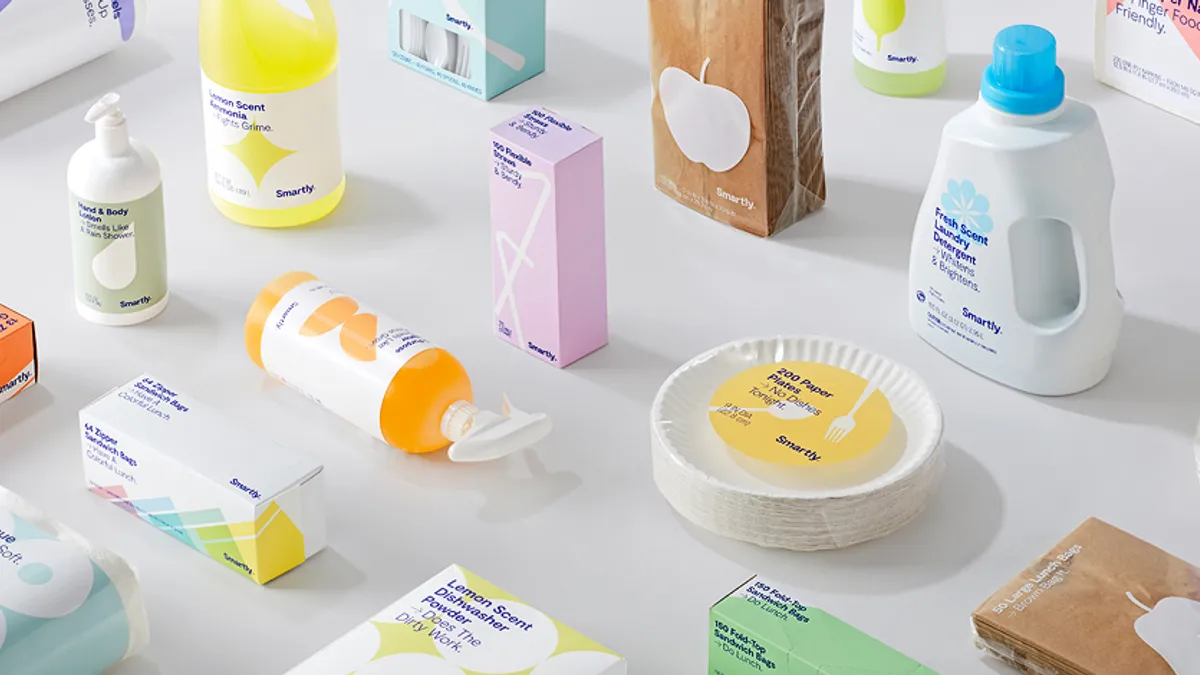Dive Brief:
-
With the accelerated sales growth of private-label consumer products from 2.2% in 2015 to 5.8% in 2018, and annual sales growing faster than national brand sales by a factor of four last year, those brands have effectively disrupted the category, according to a report from Coresight Research emailed to Retail Dive.
-
Target and Kroger recently stepped up their game in private label, at a time when small grocers like Aldi and Lidl, as well as Amazon, have all appealed to U.S. consumers with their own brands, according to the report. But Costco's Kirkland remains the titan in the space with sales exceeding $39 billion last year, reflecting a higher than 10% growth rate, Coresight said.
-
CPG makers are fighting back in various ways, Coresight said, noting efforts like Unilever's 2016 acquisition of Dollar Shave Club, Procter & Gamble's online shopping site eStore and new iterations of the products themselves.
Dive Insight:
Turns out, retailers do have some key advantages, even against behemoths like Unilever and P&G — namely, their stores and, above all, the direct relationship they have with their customers.
Specifically, access to customer data from transactions and loyalty programs "gives retailers a powerful database they can analyse to better understand customers, something CPG brands cannot match," according to Coresight's report. And retailers control "prominent shelf and display space," which they can save for their own brands.
The major consumer product owners develop and produce their own goods, while retailers must rely on third-party manufacturers for that, but retailers "face lower costs for marketing and distributions to end-consumers," Coresight also said.
As Coresight notes, the major makers are trying to grab some of the advantage back for themselves. And it's not just Unilever. In May, Edgewell Personal Care Company, which runs shaving brands Schick, Wilkinson Sword, Edge, Personna and Skintimate, snapped up grooming brand Harry's for almost $1.4 billion. P&G in recent years bought Walker & Company Brands (a startup focused on grooming and hair care for people of color, including shaving brand Bevel), New Zealand DTC skin care brand Snowberry and natural deodorant company Native.
"There's incredible value in having a direct connection to the consumer," Magid Senior Vice President of Retail Matt Sargent told Retail Dive earlier this year. "It's something that allows a company to quickly innovate and understand the dynamic, how their customer is interacting. It's what Schick doesn't have, in part because the retailer isn't going to share that info unless it's 100% beneficial to the retailer."
In addition to competition from retailers, including Target, Kroger and Amazon, the expansion of small, European grocers Aldi and Lidl in the U.S. is a threat, even if that's small right now.
"However, Aldi and Lidl are on the march in the US.," Coresight said, noting that Aldi plans to grow from more than 1,800 stores to about 2,500 stores by 2022 and that Lidl is aiming for 100 U.S. stores by the end of 2020.
"The presence of grocery discounters such as Aldi and Lidl has a meaningful impact on private label's share of a country's overall CPG market," Coresight warned. "The strength of discounters — who predominantly sell private-label products — is a major factor behind a high level of private-label penetration in Germany."
As fears of recession build and begin to shake consumer confidence, retailers' own brands could get yet another boost. In the past, consumer product sales have surged during times of economic upheaval, Coresight noted. During the 1981 to 1982 U.S. recession, for example, "private labels peaked at 17% of US supermarket sales by value," then settled to an average 14% in the two decades ended 1996, Coresight researchers said, citing the Harvard Business Review.
Then, between September 2008 and September 2009, private-label sales increased again. Before that recession, private-label consumer product unit sales "were increasing steadily but at a slower rate." This time around, as recession fears mount, any acceleration could be muted by the reality that private labels already enjoy so much growth for other reasons, Coresight said.
















